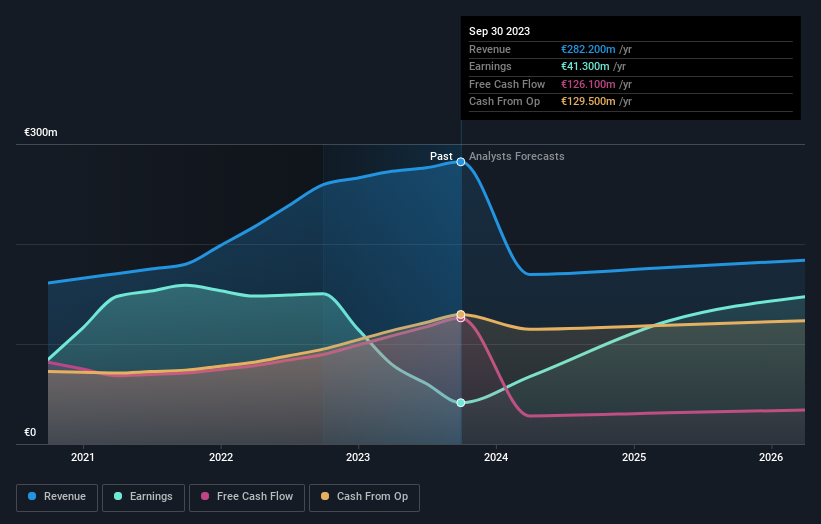Institutional shareholders may be less affected by Sirius Real Estate Limited's (LON:SRE) pullback last week after a year of 9.2% returns
Key Insights
Given the large stake in the stock by institutions, Sirius Real Estate's stock price might be vulnerable to their trading decisions
The top 18 shareholders own 51% of the company
Every investor in Sirius Real Estate Limited (LON:SRE) should be aware of the most powerful shareholder groups. The group holding the most number of shares in the company, around 55% to be precise, is institutions. In other words, the group stands to gain the most (or lose the most) from their investment into the company.
Losing money on investments is something no shareholder enjoys, least of all institutional investors who saw their holdings value drop by 4.6% last week. However, the 9.2% one-year returns may have helped alleviate their overall losses. They should, however, be mindful of further losses in the future.
In the chart below, we zoom in on the different ownership groups of Sirius Real Estate.
View our latest analysis for Sirius Real Estate
What Does The Institutional Ownership Tell Us About Sirius Real Estate?
Institutions typically measure themselves against a benchmark when reporting to their own investors, so they often become more enthusiastic about a stock once it's included in a major index. We would expect most companies to have some institutions on the register, especially if they are growing.
Sirius Real Estate already has institutions on the share registry. Indeed, they own a respectable stake in the company. This can indicate that the company has a certain degree of credibility in the investment community. However, it is best to be wary of relying on the supposed validation that comes with institutional investors. They too, get it wrong sometimes. When multiple institutions own a stock, there's always a risk that they are in a 'crowded trade'. When such a trade goes wrong, multiple parties may compete to sell stock fast. This risk is higher in a company without a history of growth. You can see Sirius Real Estate's historic earnings and revenue below, but keep in mind there's always more to the story.
Since institutional investors own more than half the issued stock, the board will likely have to pay attention to their preferences. Sirius Real Estate is not owned by hedge funds. BlackRock, Inc. is currently the largest shareholder, with 9.8% of shares outstanding. Meanwhile, the second and third largest shareholders, hold 8.5% and 5.3%, of the shares outstanding, respectively. Furthermore, CEO Andrew Coombs is the owner of 0.9% of the company's shares.
Looking at the shareholder registry, we can see that 51% of the ownership is controlled by the top 18 shareholders, meaning that no single shareholder has a majority interest in the ownership.
While it makes sense to study institutional ownership data for a company, it also makes sense to study analyst sentiments to know which way the wind is blowing. There are plenty of analysts covering the stock, so it might be worth seeing what they are forecasting, too.
Insider Ownership Of Sirius Real Estate
The definition of company insiders can be subjective and does vary between jurisdictions. Our data reflects individual insiders, capturing board members at the very least. The company management answer to the board and the latter should represent the interests of shareholders. Notably, sometimes top-level managers are on the board themselves.
Most consider insider ownership a positive because it can indicate the board is well aligned with other shareholders. However, on some occasions too much power is concentrated within this group.
Our most recent data indicates that insiders own some shares in Sirius Real Estate Limited. It is a pretty big company, so it is generally a positive to see some potentially meaningful alignment. In this case, they own around UK£17m worth of shares (at current prices). Most would say this shows alignment of interests between shareholders and the board. Still, it might be worth checking if those insiders have been selling.
General Public Ownership
With a 38% ownership, the general public, mostly comprising of individual investors, have some degree of sway over Sirius Real Estate. While this size of ownership may not be enough to sway a policy decision in their favour, they can still make a collective impact on company policies.
Next Steps:
I find it very interesting to look at who exactly owns a company. But to truly gain insight, we need to consider other information, too. To that end, you should learn about the 5 warning signs we've spotted with Sirius Real Estate (including 1 which is potentially serious) .
If you are like me, you may want to think about whether this company will grow or shrink. Luckily, you can check this free report showing analyst forecasts for its future.
NB: Figures in this article are calculated using data from the last twelve months, which refer to the 12-month period ending on the last date of the month the financial statement is dated. This may not be consistent with full year annual report figures.
Have feedback on this article? Concerned about the content? Get in touch with us directly. Alternatively, email editorial-team (at) simplywallst.com.
This article by Simply Wall St is general in nature. We provide commentary based on historical data and analyst forecasts only using an unbiased methodology and our articles are not intended to be financial advice. It does not constitute a recommendation to buy or sell any stock, and does not take account of your objectives, or your financial situation. We aim to bring you long-term focused analysis driven by fundamental data. Note that our analysis may not factor in the latest price-sensitive company announcements or qualitative material. Simply Wall St has no position in any stocks mentioned.


